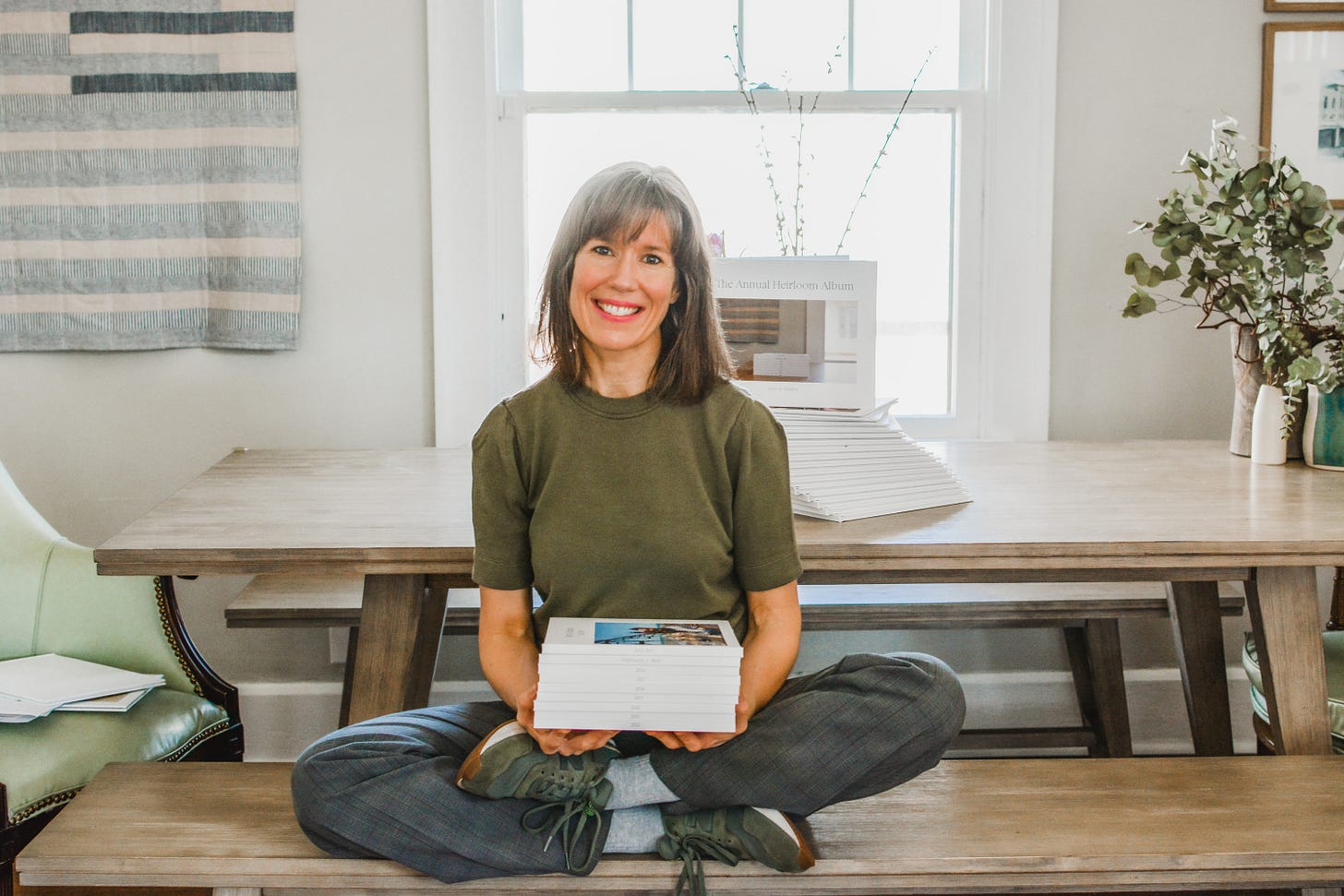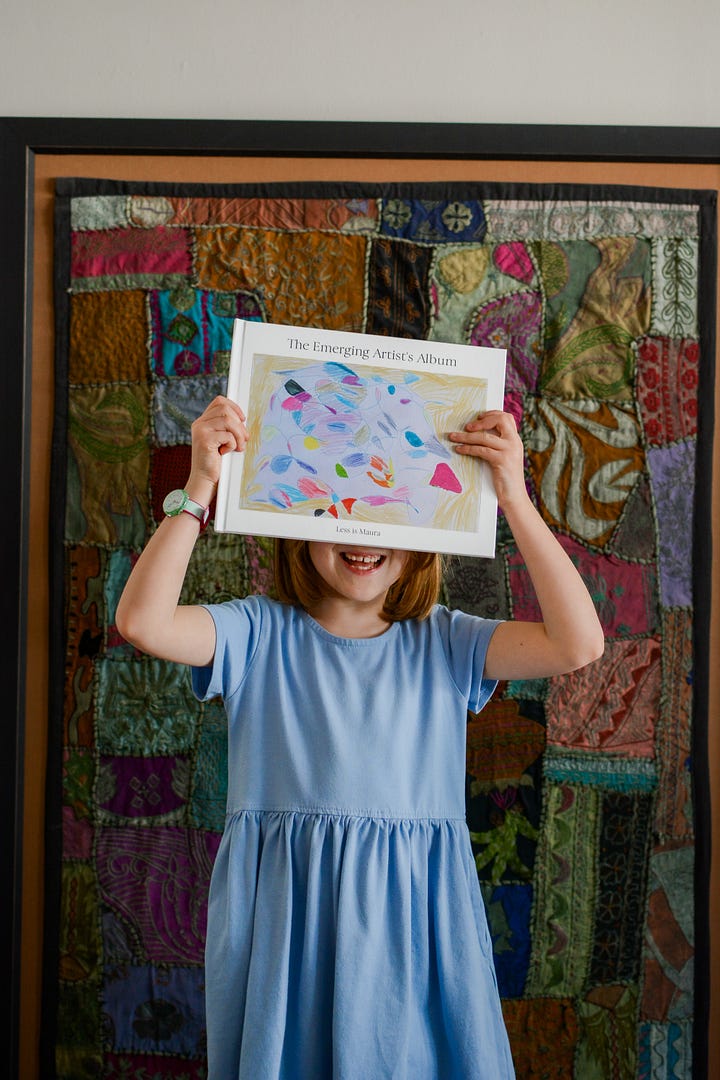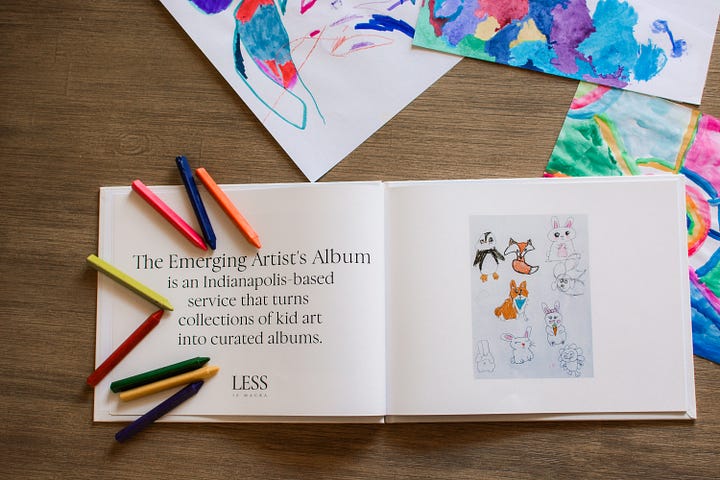Having the Courage to Treat Your Life as a Masterpiece: Interview with Writer and Digital Minimalist, Maura Malloy
This week’s interview is with writer and digital minimalist Maura Malloy. In addition to her work as a freelance writer, Maura is the owner of Less is Maura, a platform where she offers services helping people organize digital media and explores what it means to live a simple life through her writing on minimalism. She has built a following for her services such as “The Emerging Artists Album” where she turns kid art into curated albums, and “The Annual Heirloom Album,” an online class that teaches participants how to organize years of digital media into simple, stylish annual albums. Maura is also known for her TEDx Talk, “The Masterpiece of a Simple Life.”
As I read more about Maura’s story, I wanted to know: How exactly does one become a “digital minimalist memory maker?” I was also fascinated by the various roles Maura has played throughout her career. She’s written screenplays, acted, done a TEDx Talk, and is in the process of writing a book. What’s helped her be open to a life that is so wonderfully multifaceted? How does she continue to cultivate curiosity? What has she learned about failure and being open to trying things? What does it mean to live a simple life?
We spoke about all of that as well as:
How hunting for a “survival job” led to Less is Maura
The importance of asking: Am I having fun?
Being a “completist”
How dreaming big and working backward keeps her open to trying things
Being brave enough to know what your masterpiece would be
Note: The following interview has been lightly edited for clarity and length. While every effort has been made to preserve the integrity of the conversation, please be aware that the quotes may not be verbatim but reflect the essence of the dialogue.
Let’s start with a few quick questions to set the scene:
Where are you living right now? Indianapolis, Indiana.
How would you describe your occupation? I am a freelance writer. I also own a business called Less is Maura, where I help people organize digital media through album-making services, as well as teaching them simple systems via an online class. I call myself a minimalist memory maker, so I am professional organizer adjacent.

“Professional organizer adjacent” is a wonderful phrase. I'd love to rewind a little bit and actually talk about your journey moving from New York to Indianapolis and the sequence of events that led to Less is Maura. What's the inception story?
I became a minimalist in New York, living in a tiny apartment. The arc of that story is what my TEDx Talk is all about. But, essentially, I craved more space to write but my apartment wasn’t going to get any bigger! So I decluttered and the space felt bigger. When I moved to Indianapolis, space wasn’t so much an issue, but I was hooked. And I needed a new job to support my writing habit. I’d helped friends organize in the past, so I thought I’d try my hand at it professionally. At that time, I called it “A Serene Space,” and I blogged about simple living, as well as organizing others’ closets.
I wasn’t great at marketing, and it turned out that I didn’t necessarily love professional organizing for other people as much as I liked doing my own closets. But I did love to write about it. Randomly that year TEDx Indianapolis’ theme was “keep it simple,” and they invited me to be a speaker.
If you’ve seen the TEDx talk, you can tell that I am very, very pregnant. So once my daughter was born, blogging took a back seat. During the pandemic, I returned to it, but from a new angle. After the TEDx talk, I noticed that all my simple living conversations with friends had a similar theme: “I'd love for your help with my closet, but I can never show you my closet.” There was this self-judgment that people carried around it that made me uncomfortable, so I explored that in my writing.
I wanted to focus on why I organize. I really do it for my sanity. It's a coping mechanism. If I'm nervous, tidying calms me down. I have a history of anxiety, depression, and addiction. (I have 14 years of sobriety; epic gratitude right there). I felt like I was the last person people should be comparing themselves to! And, I wondered: How many other people out there organize for mental health reasons? Some people run marathons, but I clean out a closet to calm down after a stressful day.
I renamed the blog “Less is Maura” and now it serves as an umbrella under which all of this stuff, the services organizing kid art and the writing, will live and hopefully grow for all the ideas to come, like my first foray into fiction writing about a professional organizer, which I’m currently working on.

Thank you for sharing all of that. I think the process of finding “the thing” that really aligns with you when you begin building a business can be a tricky process. I think a lot of people get terrified by the iteration part because it feels like you're doing something wrong. What I’ve come to realize is that all the stops and starts are actually the steps that get you to the thing that does feel right. Does that resonate? If so, what was that iterating process like for you?
That's a great question. I didn't even realize I was necessarily iterating. For a while, I thought I had completely stopped and given up. The ideas that I actually follow through with start with something big. I tend to dream really, really big, and then I just try to get there. With “Less is Maura” I knew I wanted to write about simple living and organizing, but it was vague. At the same time, on a personal level, I couldn’t figure out how to organize my family's photos. I needed to solve a (big) problem for myself. And it had to do with organizing and minimizing, and therein sat my next mountain to climb.
I had the skills to make it into a class from years of teaching. That coupled with my acting training made the online class a possibility. I've created syllabi, I’ve organized semester-long classes, I could make handouts, talk to a camera, and make it fun. I started out to create something I would have bought if I could have found it when I was struggling.
Some random day while walking the dog, I got the idea for the book I’m writing. And it belonged under the Less is Maura umbrella. The idea was about a professional organizer who stumbles upon an unsolved mystery while cleaning out her client’s proverbial closet. It's about heirlooms and simple living. There's the arc of the story, which is the mystery, but the character’s inner arc is about her path to understanding her own mental health and why she uses organizing to calm her own inner child.
It took me 2 years to start writing it because I was so terrified. I'd only written screenplays before. But I have to see the big ideas through and eventually, I got over myself and just started writing. I now have another idea for a book, but this one would be more of a “how to” book version of the annual heirloom album. I get really excited when I feel like it all fits in under the umbrella.
I also think the older I've gotten the more I've realized that it’s okay to try something, think it’s great at the beginning, and then realize it might not be for me. When I started doing the heirloom albums, I kept really checking in with myself: Am I having fun? It turned out I was. I think now, whenever I iterate, or when I try something new, I try to be really honest with myself as I'm going through because I have limited energy every day, and there are things I really want to do, and I want to do them well. When I iterate now, I like to ask myself: Is this actually exciting or is it a reason to avoid the hard work of the thing I have to finish?
On your blog, you write, “My curiosity lies at the intersection of simple living & mental health. Is simplicity an antidote to mental health struggles? Or, does it encourage issues with control? Or both?” What have you learned in response to asking these questions?
I think I've learned that it is one of the healthiest things I've ever done to calm myself down. I’ve made some really bad choices to deal with life, and this is pretty harmless.
It shows how easily overwhelmed I can be, and that stuff really does overwhelm me. There are certain existential aspects to not accumulating stuff, and I want to be thoughtful about what I’m adding to the world. I think it also helps reveal what my values are. Are my actions in alignment or not? When can I let go of something? When can't I? It’s like when you work for a company and they tell you what their values are, but the reality of working there doesn’t reflect those values at all. I think sometimes we can do that with ourselves. We’ll say, these are my values and this is what I stand for, but then, when push comes to shove, the things that get me out of bed in the morning end up being different. Stuff can help you figure that out.
For example, I don’t love having a lot of stuff, but I love buying gifts for my daughter. It’s a way that I show her how much I love her, and I have fun doing it, so that's at odds with what I say. It reiterates that life isn't so black and white. There are a lot of gray areas. I do my best to know myself and be honest about who I am.
That makes me want to ask you about another thing you wrote. On your website, you write that “simple living isn’t simple.” How do you define simple living? What do you think are the biggest things that typically get in the way?
I think keeping up with the Joneses is a big one. With the social media-driven world that we live in today, the comparisons are right at our fingertips in a way that they weren’t before. Historically, unless you were invited to someone's house, you weren't necessarily hyper-aware of how other people lived. On top of that, we're curating what we're showing. And on top of that, we’re busier than we’ve ever been before. It’s hard to keep things simple when you’re exhausted and just trying to get to the next appointment.
Personally, I’m a recovering people pleaser. Saying no is hard, although it’s getting easier the more that I practice. If I’m not saying no, I don’t have a lot of downtime or quiet time to make space for the stuff that really matters. If I can't say no to someone for fear of disappointing them, then I might be saying no to writing that day.


You’ve played many different roles in your career as a screenwriter, freelance writer, teacher, and digital minimalist. I think the idea that we can have multifaceted identities can actually be quite hard to embrace when it feels like we are constantly forced to choose. What mindset has helped you to stay curious and open to having a multi-faceted professional identity?
I’m so flattered that you see that as a curiosity because I’m not exactly sure what has made me that way. If I think of something that feels like a really good idea, I have to pursue it. Take writing as an example. It’s not like I'm one of those writers who walks around with the notebook and gets a million ideas a day. I actually just get a handful a year or every couple of years. I think being a completist helps.
What do you mean by completist?
I have to follow things through to the end. When I wrote my first screenplay, I had never even read a screenplay. I didn't watch movies and think, “Wow! What a well-written scene!” The idea just came out of nowhere. And I had to pursue it.
You can tell me if this doesn’t land, but I want to go back to your sense of curiosity. I think a lot of people will get excited by something and then be stopped by thoughts like, “Well, I haven’t done it before so I can’t” or “I want to try this but I’m not good at it” whereas you're saying, “I want to try this so I’m going to try this,” which is a really different place to come from. It seems like that’s given you a platform to explore being multi-faceted.
I do think that the stakes were low. I didn't tell anyone about the screenplay at first (and I repeated the secrecy with the book until I finished the first draft!). I protect myself in the early stages. It’s just mine. I protect myself so I feel free, then I don’t fear failure as much because no one else knows! But, I have failed - so much that I could have a Masters in Failure. I think I'm getting a little bit less afraid of that, too. It’s better than not trying at all, in my opinion.
I have to ask you about your TEDx Talk because I loved watching it. During the talk, you spoke about the story of Michaelangelo creating the David. You share the response he gave when he was asked about how he created his masterpiece. He said, “It was simple. You just chip away until you see David.” You then ask your audience the questions: What if our lives are our masterpieces? What if we chip away until we see what matters most?” What do you think people have to overcome to be able to treat their lives as a masterpiece?
I think the capitalistic drive to succeed can get in the way. We're raised to check off the list of things we’re supposed to want and strive for as adults. I've seen people get them, and they still wake up the next day and don’t feel differently. They can’t stop drinking, even though they got their dream job. Their confidence is still in the gutter, even though they have the awards. Their fear of failure increases because now they ‘have more to lose.’
I think being brave enough to know what would be your masterpiece despite what other people say, or what expectations are put on you by society, or your parents, or yourself, is the biggest hurdle to overcome.

I love that framing - it’s not that we don’t know what we want, it’s more, will we ask for it? Will we be brave enough? That’s a great segue to one of the final things that I wanted to ask you. The theme of this blog is the idea that there are lots of different ways we could be living and working and building our lives. What’s your “no directions” life look like today?
I think this past year and a half is a great example. I've started some hobbies that aren't about making money. My day often starts with a hot yoga session and then reading. Regarding family life, we are working on mindfulness, in our own way. We recently signed a contract that my daughter wrote. My husband and I have to put our phones away from dinner time until her bedtime. I'm trying to get really honest about this device that I pick up even when I don’t want to. I’m enjoying my daughter just as she is right now. I’m taking care of myself by logging some hours of work that my heart and soul are not attached to, but where I really like my manager, and the company pays me my worth. I’m being honest about how much time I can give to my writing that day, how much work I can give to Less is Maura, and how much I have to give to mothering. And I am aware that I do not want to resent one of those because it’s taking me away from the others if that makes sense.



